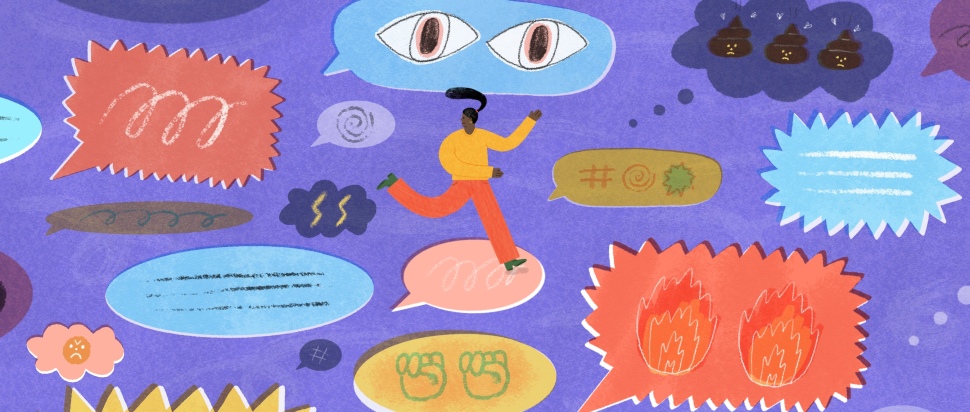Public Speaking: Activists on the cost of speaking out
It's not easy being talked about – especially when you're trying to say something important yourself. We reflect on the emotional toll of both in-person and online critique
“Don’t let Ross near your kids,” reads one of the comments.
For around two days my Twitter mentions are nothing but a steady stream of insults. I get called a paedophile, a groomer, and a misogynist. All for just…doing my job. For reporting on an issue – LGBTQ+ people, drag queens, feminism – that has become contentious, particularly on the internet. I was all of a sudden the subject of public debate, something I had never imagined myself ever becoming.
It was kind of funny, to begin with. I’ve always viewed rhetoric on social media as almost universally meaningless: I grew up in the age of Xbox Live and Habbo Hotel, after all. I figured that people had always said terrible things online and that taking any of it to heart was overly precious. I was less Be Kind and more Be Realistic. Because, just like in real life, not everybody is kind. In fact, some people are fucking horrible.
To be publicly denounced is unsettling. Regardless of how illegitimate or nonsensical the abuse may be, it’s safe to say that someone might believe it. And reckoning with the reality of people believing you are evil makes you question yourself, no matter how detached from the truth the claims might be.
This mire of self-examination isn’t something most people expect of stepping into the fray of public debate. Yet, unfortunately, it is something activists are also exposed to, with their own motivations all too often scrutinised.
“We have a running joke,” says Alice Jackson, co-founder of Strut Safe. “We pass a coin between us whenever a reporter asks Rho [Chung, the other co-founder of Strut Safe] or I whether we’ve been sexually assaulted and that’s the reason why we do this work.”
Alice and Rho co-founded Strut Safe, a helpline service that provides company and support for people walking home alone at night, following Sarah Everard’s murder.
“We just wanted to put something in place that was tangible,” says Alice. “We’re very aware that Strut Safe isn’t a solution to this problem. It’s a sticking plaster on an institutional, structural problem.”
And yet, within certain portions of the media, the thirst for a particular narrative is overwhelming. So much so that it’s as if no good deed could emerge purely as itself. It has to have a history; and preferably a dark one.
“Journalists really, really want you to talk about being sexually assaulted on camera. Because people need to feel like they are in a position of generosity to take you seriously. It’s like they’re not prepared to listen to a woman talk about this issue unless they can feel sorry for her.”
Jobs like Alice’s are hard enough even without people rabidly demanding she unspool her trauma in public.
I consider myself lucky to do the work I do but a large part of it entails near constant exposure to 'bad' news, which can take its toll. Imagine, then, if your career centred around trying to prevent acts of horrific violence or the destruction of the planet. That, in part, is an activist’s life.
“When you get to conferences like COP26,” says Dylan Hamilton, an 18-year-old climate activist, “you know that on the other side of the barriers are the bad people doing the bad things.”
Indeed, Dylan’s experience highlights how confronting – and exhausting – debate can be in real life (and not just on the internet). “It feels quite a lot like being in a fight. But I try not to think of it too much like that because it becomes very draining.
“You start to see it as win-lose and that can be very, very dangerous. Because even if we lose, we can’t stop. Every tiny little bit of climate change we can prevent matters.”
Fighting for a living takes its toll. Once bright-eyed, idealistic young people end up feeling like ageing boxers pummelled by a hostile world.
“The nature of the calls that we take,” Alice says, “And the nature of the issue that we’re dealing with on a wider scale are so upsetting, so violent, and yet at the same time so desperately human that I had a mental breakdown over it.”
That’s the cost of the work, she says. It hurts. How could it not?
“I struggle with hope,” says Dylan. “Sometimes I’ll see a huge protest and think this is amazing, this is the hope.
“But most of the time it just feels very depressing. So, I try not to think about hope because even if it looks like we’re losing we still can’t stop. Because it still matters, even when it feels hopeless.”
Hope, it seems, can only take you so far. Hope certainly doesn’t entirely sustain you through the brutalising experience of publicly standing up for what you believe in.
I didn’t understand how exposing, painful, and exhausting it is for activists to maintain momentum in a world that seems to gain pleasure from trying to hurt them, especially online where there's a crowd eager to witness your downfall. There’s a real need for us all to protect good people, doing good things, in troublesome times.
